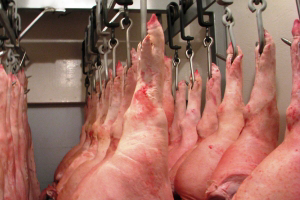Scotland: Tulip to invest in pig plant if gov. backed

A £4m investment in Scotland’s last remaining specialist pig processing plant at Brechin, Angus, is in the balance unless Scottish government backing is secured.
The investment is planned by the UK’s largest pork processor Tulip, which leases the plant from Paisley wholesaler AP Jess, to increase slaughtering capacity from 4,000 to 8,000 pigs a week. |
Tulip supply chain manager, Mike Wijnberg, speaking last week at the annual meeting of marketing group Scottish Pig Producers, made it clear the investment would not go ahead unless a 40% EU processing and marketing grant is secured.
The plant will slaughter pigs and butcher carcasses into primal cuts for further processing at Tulip plants in England.
Mr Wijnberg indicated that a response was awaited from the Scottish government, but a spokesperson said that while initial discussions had taken place with AP Jess on an application to the Food Processing and Marketing Grant Scheme, a detailed application was awaited.
“We are 100% committed to the investment provided we get Scottish government support,” said Mr Wijnberg. “It is not a viable proposition without this support for the capital investment.
The investment comes in the wake of the closure of Vion’s plant at Broxburn, near Edinburgh, which has left Scotland with limited pig processing facilities. The closure resulted in the loss of contracts for specially selected Scottish pork with Asda and Morrisons.
Following the Broxburn closure, Tulip has doubled throughput at Brechin to 4,000 pigs a week, with the plant working at maximum capacity.
SPP chairman Sandy Howie said 2012 had been one of the co-op’s most challenging years in its 33-year history because of the closure of the Broxburn plant. This had brought SPP’s pioneering Porklink arrangement with Asda to an end and also the contract slaughter of pigs for Morrisons.
Alternative marketing arrangements had been negotiated with several multi-species abattoirs and producers’ hopes were now pinned on the proposed development at Brechin and the expansion of Morrisons’ plant at Colne in Lancashire.
“Retailers are now all focused on sourcing British meat following the horsemeat scandal,” said Mr Howie. “It is up to us to be involved in these changes to secure a future for our producers by forming meaningful partnerships with those committed to our industry.”
The value of pigs handled by the group increased by £2m to £55.2m during 2012, while the average value rose by almost £3 a pig. Mr Howie stressed that although pig prices were firming, producers were still facing losses because of soaring feed costs and a pig price which failed to cover production costs.
SPP’s turnover was down in 2012 from almost £1.9m to almost £1.6m, with costs down from £1.6m to lower than £1.3m, resulting in a margin of £287,390 compared with £261,445 in 2011.
Turnover at the marketing group is made up largely of the procurement fee received from abattoirs while costs are mainly haulage. The pre-tax surplus was £11,251, similar to the previous year, while the group holds reserves of £177,717 against £166,466 last year. A third of SPP’s activities is now in Northern Ireland.
Source: Eddie Gillanders, Farmers Weekly











